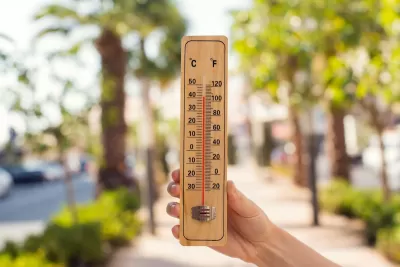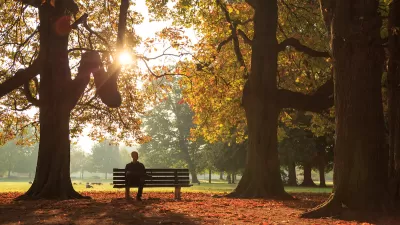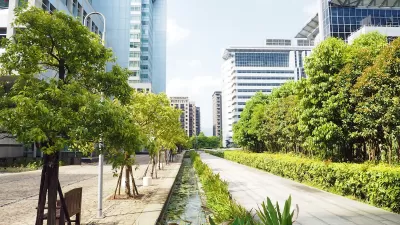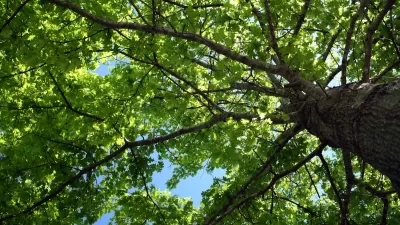A robust tree canopy can help reduce the urban heat island effect and lower air temperatures, but the impact is reduced as temperatures rise.

A new study from the University of New South Wales reveals that the ability of trees to combat overheating is reduced in extremely hot temperatures. “The findings, published in Sustainable Cities and Society, opens in a new window, show that conventional climate models overestimated the ability of trees to cool during heat waves by 60 per cent.”
The study poses a serious problem for cities relying on planting trees as a key part of their heat mitigation strategy. “It’s not to say that tree planting initiatives aren’t important for heat mitigation, but that large-scale planting policies require careful consideration,” said one of the study’s co-authors, Professor Mattheos (Mat) Santamouris.
As Ben Knight explains in the article, trees typically reduce surrounding air temperatures by 1 to 2 degrees Celsius in the daytime by releasing vapor through their leaves and absorbing heat. In high heat conditions, trees limit their transpiration, a factor not accounted for in current climate forecasts.
In the study’s sample of eucalyptus trees in Sydney, two-thirds of the trees were overestimated in their cooling ability during extreme heat by 60 percent. “Prof. Santamouris says decision-makers need to be more selective about the types of trees used and their various temperature thresholds. Under extreme temperatures, trees can also emit high concentrations of Biogenic Volatile Organic Compounds (BVOCs) like Isoprene, which can harm air quality when they interact with other atmospheric pollutants.”
Santamouris also warns that urban trees need adequate irrigation to provide optimal cooling benefits.
FULL STORY: Trees may not cool cities during heat waves as much as we thought

Trump Administration Could Effectively End Housing Voucher Program
Federal officials are eyeing major cuts to the Section 8 program that helps millions of low-income households pay rent.

Planetizen Federal Action Tracker
A weekly monitor of how Trump’s orders and actions are impacting planners and planning in America.

Ken Jennings Launches Transit Web Series
The Jeopardy champ wants you to ride public transit.

Opinion: Transit Agencies Must View Service Cuts as Last Resort
Reducing service could cripple transit systems by pushing more riders to consider car ownership, making future recovery even less certain.

‘Smart Surfaces’ Policy Guide Offers Advice for Building and Maintaining Urban Tree Canopies
Healthy, robust tree canopies can reduce the impacts of extreme heat and improve air quality.

New Jersey Lawsuit Targets Rent-Setting Algorithms
The state of New Jersey is taking legal action against landlords and companies that engage in what the state’s Attorney General alleges is illegal rent fixing.
Urban Design for Planners 1: Software Tools
This six-course series explores essential urban design concepts using open source software and equips planners with the tools they need to participate fully in the urban design process.
Planning for Universal Design
Learn the tools for implementing Universal Design in planning regulations.
Heyer Gruel & Associates PA
Ada County Highway District
Institute for Housing and Urban Development Studies (IHS)
City of Grandview
Harvard GSD Executive Education
Toledo-Lucas County Plan Commissions
Salt Lake City
NYU Wagner Graduate School of Public Service





























